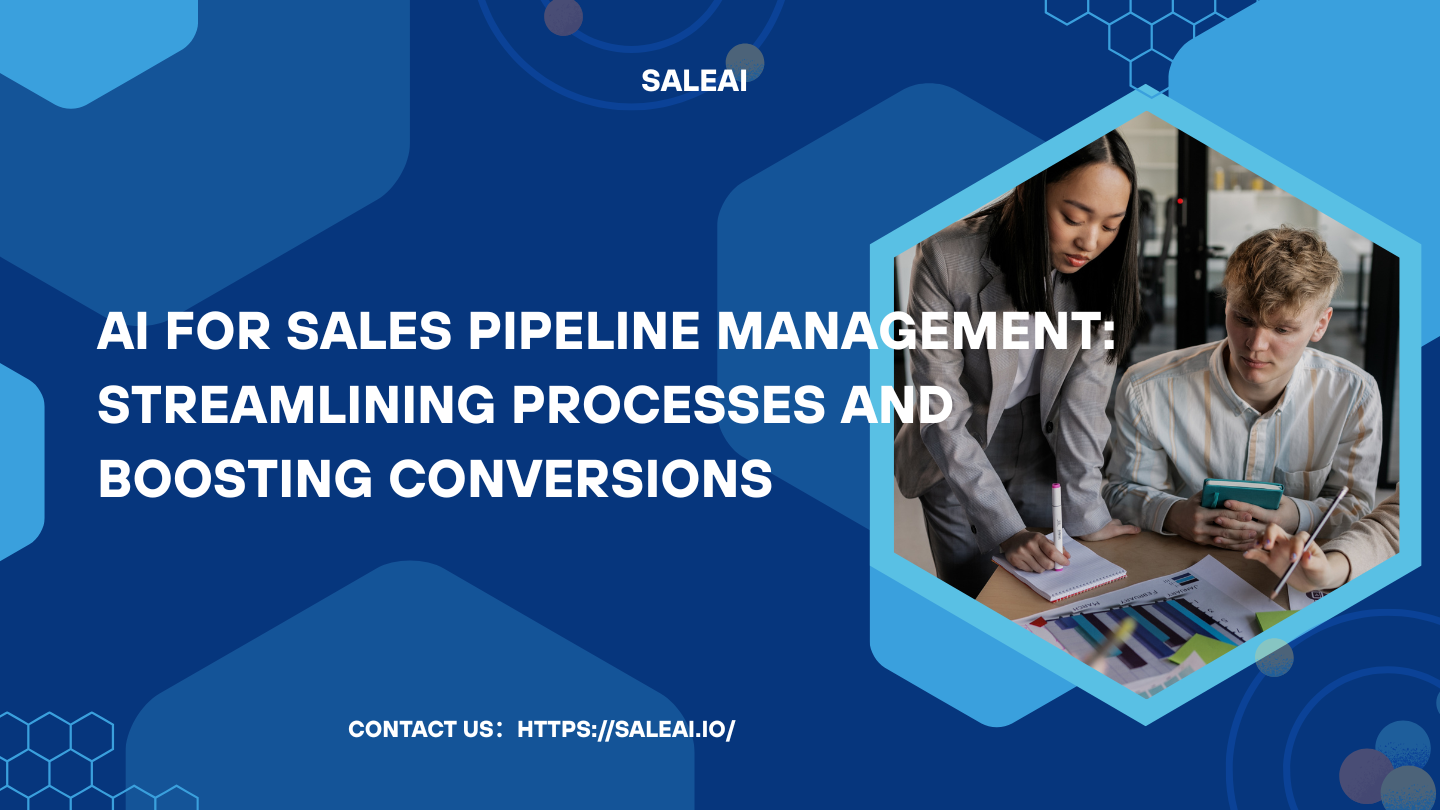Introduction: The Evolution of Sales Pipeline Management
Managing a sales pipeline effectively has always been a critical component of driving revenue. From tracking leads to closing deals, a well-maintained pipeline provides visibility into opportunities, bottlenecks, and overall performance. However, traditional pipeline management approaches are often manual, error-prone, and lack real-time insights.
Enter AI-powered sales pipeline management—a transformative solution that enables businesses to not only visualize their pipeline but also optimize every stage of the sales journey. By leveraging AI, organizations can automate tedious processes, predict deal outcomes, and focus on high-impact activities that drive conversions.
This article explores the key elements of AI-driven pipeline management, its benefits, and how SaleAI empowers businesses to take control of their sales processes like never before.
What is AI-Powered Sales Pipeline Management?
AI-powered sales pipeline management involves applying artificial intelligence and machine learning algorithms to monitor, analyze, and optimize the stages of a sales pipeline. Unlike traditional methods that rely on static data and manual updates, AI introduces dynamic insights, predictive analytics, and actionable recommendations.
Key components of AI-driven pipeline management include:
- Pipeline Visualization: Real-time updates on the status of deals at every stage.
- Predictive Analytics: Forecasting deal closures and revenue with high accuracy.
- Automation: Reducing manual tasks like data entry and follow-up scheduling.
- Bottleneck Identification: Highlighting stages where deals are stalling or dropping off.
The Role of AI in Sales Pipeline Optimization
a. Enhanced Pipeline Visibility
AI tools provide a centralized, real-time view of your entire pipeline, giving sales leaders and teams clarity on:
- The number of deals in each stage.
- The value of opportunities and their probability of closing.
- Historical trends to identify what’s working and what’s not.
b. Predictive Deal Scoring
Using historical data and machine learning, AI predicts the likelihood of deal closures based on:
- Prospect engagement levels.
- Behavioral patterns (e.g., email responses, website visits).
- External factors like market trends or competitor activity.
This allows sales teams to prioritize high-probability deals and allocate resources more effectively.
c. Automation of Routine Tasks
AI automates many aspects of pipeline management, including:
- Automatically updating deal stages based on activity.
- Sending reminders to follow up on inactive deals.
- Generating reports and forecasts without manual input.
d. Bottleneck Detection and Recommendations
AI tools analyze pipeline data to identify where deals are stalling. For example:
- A high drop-off rate at the proposal stage may indicate issues with pricing.
- Delayed responses from prospects could suggest poor timing or lack of interest.
AI provides actionable recommendations to address these bottlenecks, such as adjusting messaging or offering incentives.
e. Continuous Learning and Improvement
AI systems learn from past data to improve over time. This means your pipeline management processes become smarter and more efficient as the AI adapts to your business’s unique sales patterns.
Benefits of AI for Sales Pipeline Management
a. Increased Sales Efficiency
By automating repetitive tasks and reducing manual data entry, AI frees up your sales team to focus on building relationships and closing deals.
b. Better Forecast Accuracy
Predictive analytics ensure more accurate revenue forecasting, helping businesses plan resources and budgets with confidence.
c. Improved Conversion Rates
With AI highlighting high-priority deals and providing insights into customer behavior, sales teams can tailor their approach for maximum impact.
d. Reduced Pipeline Leakage
AI identifies and addresses potential drop-off points in your pipeline, minimizing lost opportunities.
e. Data-Driven Decision-Making
AI provides actionable insights based on real-time data, enabling sales leaders to make informed decisions about strategy and resource allocation.
Key Features of AI-Powered Pipeline Management Tools
a. Real-Time Pipeline Monitoring
AI tools like SaleAI offer dashboards that provide a live view of your pipeline, showing deal progress, potential revenue, and key performance indicators (KPIs).
b. Deal Prioritization
AI assigns priority levels to deals based on their likelihood of closing, helping teams focus on the most valuable opportunities.
c. Automated Follow-Ups
AI-powered systems send automated follow-up emails or reminders based on prospect activity, ensuring no deal slips through the cracks.
d. Scenario Planning
AI allows sales leaders to simulate different scenarios, such as changes in deal velocity or market conditions, to prepare for potential challenges.
e. Integration with CRM Systems
AI tools integrate seamlessly with popular CRM platforms, syncing data automatically and eliminating the need for manual updates.
How SaleAI Elevates Pipeline Management
SaleAI is designed to take the guesswork out of pipeline management, providing businesses with the tools they need to optimize their sales processes. Here’s what sets SaleAI apart:
a. Advanced Predictive Analytics
SaleAI’s algorithms analyze historical and real-time data to provide:
- Accurate deal closure predictions.
- Revenue forecasts for upcoming months or quarters.
- Insights into pipeline health and performance trends.
b. Proactive Alerts
SaleAI sends alerts for:
- Deals that require immediate attention.
- Stalled opportunities that risk falling through.
- High-value prospects showing increased engagement.
c. Customizable Dashboards
SaleAI’s intuitive dashboards allow users to:
- Track pipeline metrics in real time.
- Customize views based on team or individual performance.
- Access detailed reports with just a few clicks.
d. Seamless Integration
SaleAI integrates with major CRM platforms like Salesforce, HubSpot, and Zoho, ensuring a smooth flow of data across systems.
e. Scalability for Growing Businesses
Whether you’re a small business or a large enterprise, SaleAI scales to meet your needs, offering robust pipeline management solutions at every stage of growth.
Real-World Success with AI-Driven Pipeline Management
Case Study: Improving Pipeline Efficiency
Challenge:
A mid-sized tech company faced challenges with pipeline visibility and deal prioritization, leading to missed opportunities and inaccurate forecasts.
Solution:
After implementing SaleAI’s pipeline management tools, the company achieved:
- A 50% reduction in the time spent on manual pipeline updates.
- A 20% increase in deal closure rates by focusing on high-priority opportunities.
- Improved forecast accuracy, enabling better resource planning and budgeting.
Steps to Implement AI-Driven Pipeline Management
- Audit Your Current Pipeline: Evaluate your pipeline stages, bottlenecks, and overall performance to identify areas for improvement.
- Integrate Data Sources: Ensure your CRM and sales tools are connected to provide a unified data flow.
- Choose an AI Platform: Select a solution like SaleAI that offers advanced pipeline management features and seamless CRM integration.
- Train Your Team: Educate your sales team on how to use AI-powered tools effectively.
- Monitor and Optimize: Regularly review AI-generated insights and pipeline performance metrics to refine your strategies.
The Future of Sales Pipeline Management with AI
As AI continues to evolve, sales pipeline management tools will become even more sophisticated, offering:
- Deeper Behavioral Insights: Understanding customer intent and preferences at a granular level.
- Natural Language Processing (NLP): Automating deal updates and communication through AI chatbots or voice assistants.
- Advanced Predictive Modeling: Simulating long-term sales outcomes based on historical and market data.
By adopting AI-powered pipeline management today, businesses can stay ahead of the competition, streamline their operations, and achieve sustainable growth.



